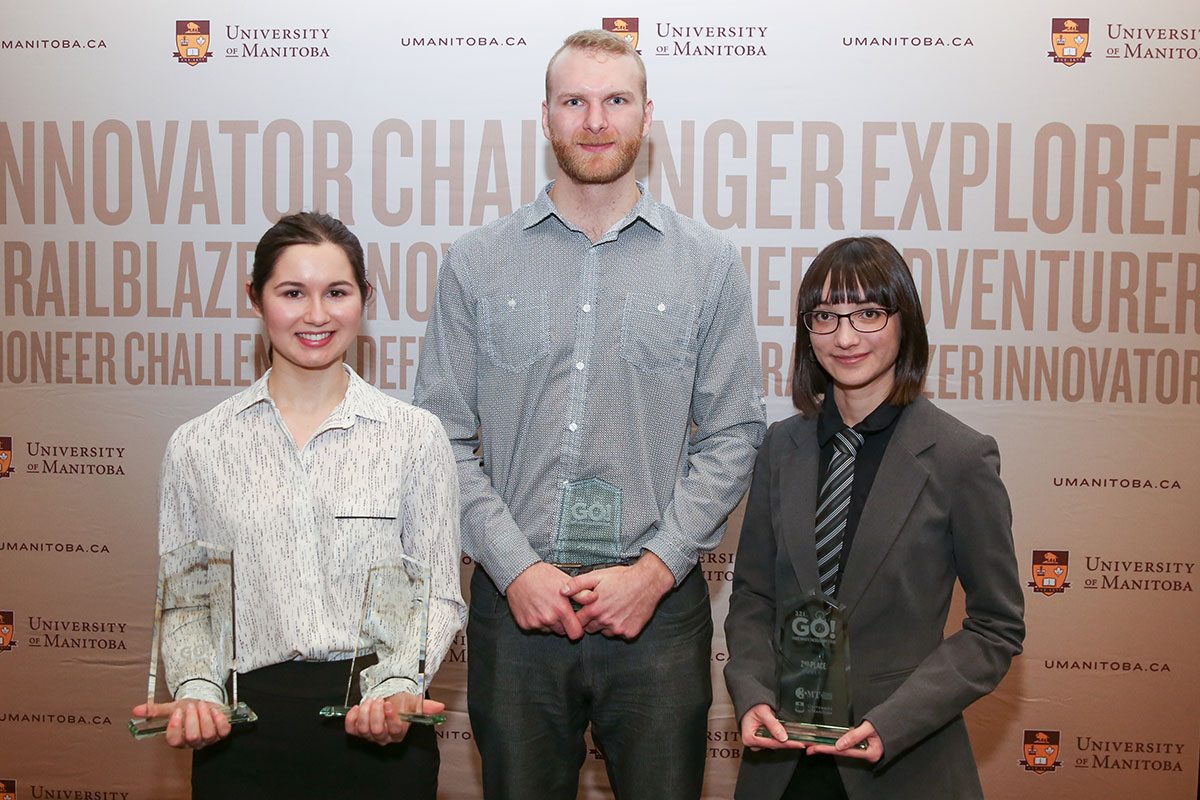
(L-R) Rachel Nickel (winner of People's Choice and Dr. Archie McNicol Prize), Colin Graydon (winner of Third Place Prize), and Alexandra Ciapala (winner of Second Place Prize) at the Three Minute Thesis final on March 8, 2017. // Photo by Mike Latschislaw
Seeking out innovative ways to help enhance lives
The Three Minute Thesis (3MT®) final competition on Wednesday night gave the community an insightful look at some of the groundbreaking research that grad students have undertaken at the University of Manitoba across several faculties and departments.
Rachel Nickel, who is in her first year of a master’s program in the department of physics and astronomy, took home the first-place Dr. Archie McNicol Prize, worth $2,000. She also won the People’s Choice award, as voted on by the audience that filled the Robert B. Schultz Lecture Theatre for the event.
“I’m thrilled. I judge figure skating so I have some experience being on a panel of judges and it’s really hard to make a decision. So many of the talks tonight were fabulous,” said Nickel.
Her research, entitled Biocide Coated Magnetic Nanoparticles: a New Way to Treat Infections, looks at finding inventive ways to treat antibiotic resistant bacteria. “Antibiotic resistance is really becoming a global health-care problem. These resistant infections are practically untreatable. We’re looking at different ways that we can attack the problem,” Nickel told UM Today.
Biocides are substances that inhibit or destroy growth.
“Bacteria doesn’t develop a resistance to these biocides,” says Nickel. “But they’re very harmful to human cells so we need to find a way to limit the contact. We’re using magnetic nanoparticles as a vehicle to deliver the biocide to the infection site, but then we can also use it to remove the biocides after treatment.”
This year, the prize for first place was named in honour of Dr. Archie McNicol, who passed away unexpectedly in December.
“Dr. McNicol had a long and distinguished career with the university, including five years as associate dean in the Faculty of Graduate Studies,” said U of M President and Vice-Chancellor David Barnard.
“He was a beloved teacher, an accomplished researcher and a passionate supporter of graduate students and a good friend to many of us. To honour his legacy, the Dr. Archie McNicol prize will be given annually for first place in this competition,” said Barnard.
Three Minute Thesis is a research communication competition first developed by The University of Queensland in Australia. 3MT® challenges graduate students to fuse their ideas and research discoveries so they can be presented succinctly to a non-specialist audience.
Each competitor has three minutes, using only a single slide as an illustration, to clearly explain the nature, goals and significance of his or her research.
“The ability to explain the meaning and value of one’s research is an important skill that will help these competitors in their post-graduate employment and in their service to the community. And we have every reason to believe that these talented students will make significant contributions after they leave the University of Manitoba,” said President Barnard.
Research presented at the 3MT® final on Wednesday night examined a variety of topics, from how to apply mathematics to real-world systems and problems, finding news ways to attack HIV, exploring ideas on how to improve people’s health as they age and how to increase support for mothers whose children are taken into care.
Alexandra Ciapala, from biochemistry and medical genetics, captured the Second Place Prize ($500) at the 3MT® final for her research: Siege Tactics in Fighting the War on Cancer.
Ciapala has been funded by a Terry Fox Rising Star Entrance Studentship and a Research Manitoba/CancerCare Manitoba Foundation Studentship. She has also received several awards including the Sheu L. Lee Family Scholarship in Oncology Research.
Colin Graydon, from medical microbiology and infectious diseases, won the Third Place Prize ($250) at the 3MT® final for his research entitled: LAG-3: A Immune Handbrake with an Unknown Mechanism.
Graydon is one of four U of M students to receive the 2016 Vanier Scholarship.
Students from a range of academic departments rounded out the evening, with presentations from mathematics, economics, community health sciences, physiology and pathophysiology, animal science, biochemistry and medical genetics, immunology and kinesiology and recreation management.
A list of all the finalists and their research topics can be found here.
Following her win Wednesday night, Nickel will go on to the Western Regional Three Minute Thesis competition on April 29.
She hopes the research she’s involved in leads to a way to save lives and protect people from antibiotic-resistant superbugs.
“I think this is a usable application as long as we figure out the right delivery mechanism. Ideally, it would be great if we could figure out a way to manufacture this so it could go into production, into clinical use, as soon as possible. That would be the long-term goal of this research,” she said.
Nickel received the NSERC Undergraduate Student Research Awards 2015 and 2016.
Paul Samyn, editor of the Winnipeg Free Press, acted as MC of Wednesday night’s event. “We should all be leaving this place a lot more optimistic about the future because of what’s happening here and what we’ve seen. The research that is underway is going to make our city and our country a lot better,” said Samyn.
Join the conversation on Twitter! Follow us at @umanitoba and tag your tweets with #3MT and #umanitoba
Research at the University of Manitoba is partially supported by funding from the Government of Canada Research Support Fund.






